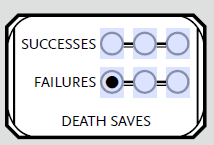Corruption in Middle-earth for 5e
Corruption is a recurring theme in the stories of Middle-earth. Some players and DMs might incorporate this theme through storytelling. But if you wish to include a game mechanic for how characters are tempted and the gradual process of corruption, here are variant rules for that.
A character may gain one corruption point whenever they:
A character may resist gaining a corruption point by making a successful DC 20 Wisdom saving throw.

For each corruption point, permanently mark off one Death Save Failure on the character's sheet. These also count as death save failures when making death saving throws (see the Player's Handbook p.197 or Basic Rules p. 76).
The seductive nature of corruption does grant some benefits to those who dare to draw closer.
1 corruption point. Temptation. A character with 1 corruption point may add their proficiency bonus to any one ability check, saving throw, or attack roll, including one that has already added a proficiency bonus. This may only be used once until a short rest is completed.
2 corruption points. Desire. A character with 2 corruption points gains advantage on any one ability check, saving throw, or attack roll. If the roll already had advantage, the roll may be retaken (with advantage again on the reroll). If the roll had disadvantage, the roll may be taken with advantage instead. This may only be used once until a short rest is completed.
3 corruption points. Wrath. A character with 3 corruption points may replace the result of any one of their ability checks, saving throws, or attack rolls with a 20 after they have seen the roll; it is not a natural 20. This may only be used once until a short rest is completed.
A character can gain up to 3 corruption points without succumbing to their dark nature. Upon receiving a 4th corruption point, the character is consumed by their corruption, succumbing to the Darkness, and becomes a non-player character played by the dungeonmaster driven by their obsession.
A character may remove 1 corruption point by performing a heroic and epic act of self-sacrifice. Such circumstances are rare and are usually fatal.